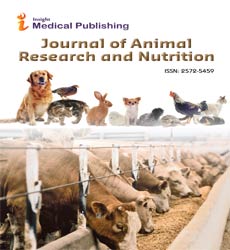Agricultural Practices and their Effects on Animal Welfare
Giovanni Anoldo*
Department of Veterinary Medicine, Jimma University, Jimma, Ethiopia
Giovanni Anoldo*
1Department of Veterinary Medicine, Jimma University, Jimma, Ethiopia
- *Corresponding Author:
- Giovanni Anoldo,
Department of Veterinary Medicine, Jimma University, Jimma, Ethiopia
E-mail: Harper_h@gmail.com
Received date: September 18, 2024, Manuscript No. IPJARN-24-19743; Editor assigned date: September 20, 2024, PreQC No. IPJARN-24-19743 (PQ); Reviewed date: October 04, 2024, QC No. IPJARN-24-19743; Revised date: October 11, 2024, Manuscript No. IPJARN-24-19743 (R); Published date: October 18, 2024, DOI: 10.36648/2572-5459.9.5.139
Citation: Anoldo G (2024) Agricultural Practices and their Effects on Animal Welfare. J Anim Res Nutr Vol.9 No.5: 139.
Description
Agriculture plays an important role in providing food, fiber and other need resources to support human life. However, the agricultural industry, especially intensive farming systems, can have significant implications for animal welfare. The way animals are raised in agricultural settings whether for food, labor or other purposes affects their physical and mental well-being. Understanding the relationship between agricultural practices and animal welfare is need for improving both animal husbandry and the sustainability of farming systems. This article describes various agricultural practices and their effects on animal welfare, highlighting the challenges and potential solutions.
Animal welfare in agriculture
To mitigate the negative effects of agricultural practices on animal welfare, several strategies can be implemented. One of the most effective approaches is to transition to more sustainable and humane farming systems, such as free-range, pasture-based or organic farming. In these systems, animals are provided with more space to roam and engage in natural behaviors, which can lead to improved physical and mental health. Additionally, the use of enrichment materials, such as straw, toys or other items, can help reduce stress and prevent behavioral problems in confined animals.
Regulations and standards related to animal welfare also play a need role in improving conditions on farms. Governments, industry organizations and animal welfare groups must work together to ensure that animals are treated ethically throughout their lives, from birth to slaughter. Implementing stronger welfare regulations, such as limiting the use of extreme confinement systems and improving transportation conditions, can help ensure that animals are not subjected to unnecessary suffering.
Intensive farming, also known as industrial agriculture, involves the mass production of animals in confined spaces with the aim of maximizing productivity. This method is commonly used for raising livestock such as chickens, pigs and cattle. In these systems, animals are often kept in overcrowded conditions, which restrict their ability to express natural behaviors. For instance, chickens are often confined to battery cages, where they have little room to move, while pigs may be housed in gestation crates that prevent them from turning around. Such confinement leads to physical and psychological stress, as animals are unable to engage in behaviors that are instinctual for them, such as foraging, roaming or socializing with others of their kind.
The consequences of intensive farming practices on animal welfare are numerous. Animals in these systems often experience high levels of stress, which can lead to health problems such as immune suppression, injuries and disease outbreaks. The crowded conditions increase the likelihood of aggressive behavior, such as cannibalism in poultry or fighting among pigs. Furthermore, these practices can result in poor mental health, as animals in confinement are unable to engage in activities that promote their well-being, such as exercising or exploring their environment. The lack of enrichment in their environment can lead to behavioral abnormalities, including stereotypies repetitive, compulsive behaviors such as pacing or bar-biting.
Environmental conditions and animal welfare
The environmental conditions in which farm animals are kept also play an important role in their welfare. Poorly designed facilities with inadequate ventilation, lighting and bedding can lead to a range of problems for animals. Overcrowded conditions can increase the risk of disease transmission, as animals are more likely to come into contact with pathogens when housed in close proximity. Inadequate ventilation can lead to the buildup of ammonia from urine, which can cause respiratory issues and discomfort for animals. Poor bedding or the lack of bedding entirely can result in injuries such as abrasions, sores and pressure ulcers, particularly for animals kept in concrete or metal-floored pens.
Additionally, poor sanitation practices in intensive farming systems can exacerbate health problems. The accumulation of waste in confined spaces can lead to the spread of infectious diseases and parasites, further compromising the health and welfare of the animals. In some cases, these practices may also increase the use of antibiotics and other medications to control disease outbreaks, which raises concerns about the development of antibiotic resistance and the potential for harmful residues in the food supply.

Open Access Journals
- Aquaculture & Veterinary Science
- Chemistry & Chemical Sciences
- Clinical Sciences
- Engineering
- General Science
- Genetics & Molecular Biology
- Health Care & Nursing
- Immunology & Microbiology
- Materials Science
- Mathematics & Physics
- Medical Sciences
- Neurology & Psychiatry
- Oncology & Cancer Science
- Pharmaceutical Sciences
